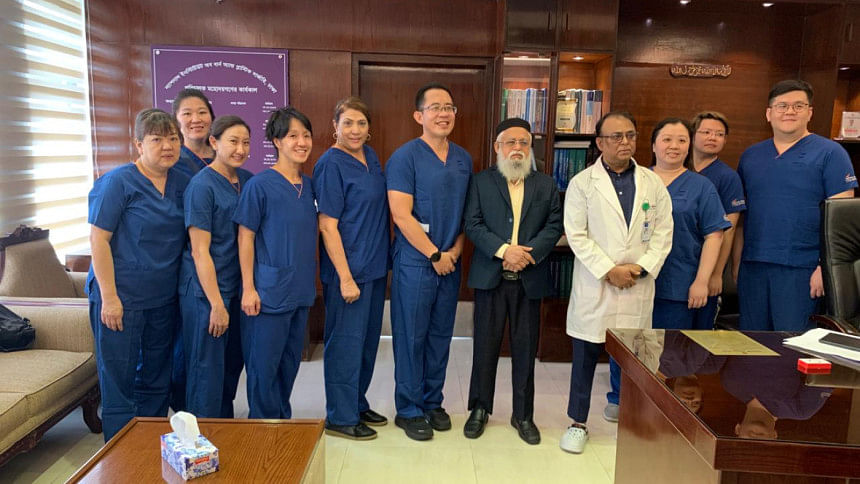Cross-border care for Milestone tragedy victims

In the aftermath of the tragic fighter plane crash that severely injured many students from Milestone School and College, a team of specialised medical professionals from Singapore immediately arrived in Dhaka to provide critical care support. The mission, driven by humanitarian urgency, was swiftly mobilised in response to calls from the Government of Bangladesh and the National Institute of Burn and Plastic Surgery.
"We are here to support—not to take over," said Dr Jolin Wong from Singapore General Hospital, one of the team members deployed in this emergency initiative. "Our primary role has been to assess critical cases in the ICU and high-dependency units, offering expert guidance to the local medical teams who have already done a commendable job."
The Singaporean team includes intensivists, nurses, and infection control experts, many of whom have long-standing professional relationships with the Bangladeshi medical community. They have not performed any invasive procedures but are offering consultation support to ensure the highest quality of care is maintained for patients, most of whom are children.
According to the visiting doctors, more than 50 per cent injured patients are expected to recover and walk out of the hospital—a significant improvement compared to past burn incidents in the country. "Ten years ago, such survival rates would have been unimaginable," said Dr Chong Si Jack, Senior Consultant, and Burns Specialist, emphasising the impact of training and collaborative efforts over the years.
The support mission was initiated through rapid coordination between the Singaporean Ministry of Health, SingHealth Group, and the Bangladesh Ministry of Foreign Affairs. The team praised the seamless collaboration with the Bangladesh High Commission in Singapore and the local authorities for facilitating their quick deployment, including logistics, travel, and customs clearance of essential wound care supplies.
While commending the surgical capabilities of the Burn Institute, the team highlighted critical gaps in intensive care services. "Bangladesh has made significant progress, but ICU management remains an area that needs further investment—especially in trained intensivists, infection control protocols, and real-time patient monitoring," said one of the team leaders.
They also pointed out the need for better infrastructure around the burn institute to avoid logistical delays in future emergencies. "In mass casualty situations, minutes can save lives. Having just one narrow entry point for ambulances is a bottleneck that needs urgent attention."
Infectious disease control remains another concern. Cultural practices such as bringing home-cooked meals to hospitals and the presence of large crowds of visitors can introduce harmful bacteria to already vulnerable patients. "We understand these are deeply ingrained habits, but in ICU settings, stricter protocols could help save more lives," noted a member of the infection control team.
Despite speculations in the media, the team clarified that there is no current plan to transfer patients to Singapore. "Our goal is to support local care. The decision to treat patients here was both scientific and compassionate. The Burn Institute is well-equipped, and the staff is highly trained," affirmed Dr Chong.

Looking ahead, both Bangladeshi and Singaporean teams see this crisis as a catalyst for long-term collaboration. "This isn't just a one-time intervention. It's about strengthening systems, building capacities, and sharing knowledge—so that we can all be better prepared for the future," said Ms Vijaya Rao, Senior Director, International Collaboration Office, SingHealth.
The visiting team also commended the spirit of the Bangladeshi doctors and nurses. "Working with them feels like working from the heart," one nurse remarked. "This partnership is built on trust, mutual respect, and a shared commitment to saving lives."

 For all latest news, follow The Daily Star's Google News channel.
For all latest news, follow The Daily Star's Google News channel. 



Comments